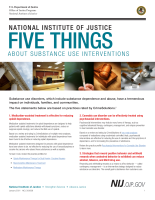Meta-Analysis
Preservation Methods Differ in Fecal Microbiome Stability, Affecting Suitability for Field Studies
Insights into the genetic architecture of the human face
Five Things About Substance Use Interventions
Transparency and Reproducibility of Meta-Analyses in Psychology: A Meta-Review
Locating unregistered and unreported data for use in a social science systematic review and meta-analysis.
Female Reentry and Gender-Responsive Programming: Recommendations for Policy and Practice
Impact of COVID-19 on School Safety Research - Roundtable Discussion, NIJ Virtual Conference on School Safety
On February 16-18, 2021, the National Institute of Justice hosted the Virtual Conference on School Safety: Bridging Research to Practice to Safeguard Our Schools. This video present a roundtable discussion from the conference.
See the YouTube Terms of Service and Google Privacy Policy
School Transitions and Student Responses to Victimization - Breakout Session, NIJ Virtual Conference on School Safety
On February 16-18, 2021, the National Institute of Justice hosted the Virtual Conference on School Safety: Bridging Research to Practice to Safeguard Our Schools. This video includes the following presentations:
See the YouTube Terms of Service and Google Privacy Policy
Hunt for Randomized Experimental Reports: Document Search and Efforts for a "What Works?" Meta-Analysis
Twelve Experiments in Restorative Justice: The Jerry Lee Program of Randomized Trials of Restorative Justice Conferences
Pittsburgh Youth Study: Relative Improvement Over Chance (RIOC) for 2x2 Tables
Crime and Justice: A Review of Research, Volume 32
Trends in DNA Methylation With Age Replicate Across Diverse Human Populations
Assessing Correctional Rehabilitation: Policy, Practice, and Prospects
Are Restorative Justice Conferences Effective in Reducing Repeat Offending? Findings from a Campbell Systematic Review
Importance of Risk Assessments to Positive Outcomes for Youth - Juvenile Justice Research Spotlight
Dr. Vincent discusses her research on how risk assessment and risk need responsivity affect change in how we handle individuals in the justice system.
See the YouTube Terms of Service and Google Privacy Policy
Applying the Latest Research to Prevent Bullying: Empowering Schools to Change Behavior & Attitudes
Bullying prevention is an important aspect of school safety. During this webinar, co-sponsored by NIJ and the Federal Partners in Bullying Prevention, renowned bullying prevention researchers will share information schools can use to address bullying. This information will include helping teachers respond to bullying in the classroom and giving students who see bullying tools to take action to address it.
See the YouTube Terms of Service and Google Privacy Policy
Solutions in Corrections: Using Evidence-based Knowledge
Professor Ed Latessa describes how his team and he assessed more than 550 programs and saw the best and the worst. Professor Latessa shared his lessons learned and examples of states that are trying to use evidence-based knowledge to improve correctional programs.
See the YouTube Terms of Service and Google Privacy Policy
Reforming New Orleans' Criminal Justice System: The Role of Data and Research
With its criminal justice system in disarray following Hurricane Katrina, New Orleans invited the Vera Institute of Justice to examine the city's court and jail operations. For five years, Vera has been tracking arrest-to-first-appearance time, custodial arrests versus summonses, the granting of pretrial release, and many other decision-making points. Based on analysis of these data, Vera is making policy recommendations to assist with the implementation of new procedures and to ensure performance monitoring.
An Examination of Justice Reinvestment and Its Impact on Two States
Funded in part by the Bureau of Justice Assistance and the Pew Center on the States, the justice reinvestment project is a data-driven strategy aimed at policymakers to "reduce spending on corrections, increase public safety and improve conditions in the neighborhoods to which most people released from prison return." Representatives from two states where the justice reinvestment strategy is currently being implemented will discuss how it is being used to reduce the rate of incarceration and how states can reinvest in local communities.
What Is Research and Evaluation Evidence and How Can We Use It?
This NIJ Conference Panel will explore the development and use of evidence-based policies, programs and technologies to improve effectiveness and efficiencies related to government. Through casual observation, practices and programs may appear to be effective, but under closer scrutiny the results may look much different.



